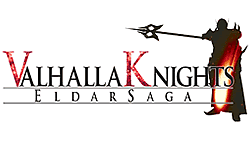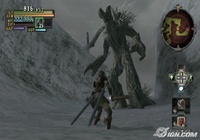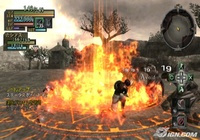|
|

|
PLATFORM
|
Wii
|
BATTLE SYSTEM
|

|
INTERACTION
|

|
ORIGINALITY
|

|
STORY
|

|
MUSIC & SOUND
|

|
VISUALS
|

|
CHALLENGE
|
Unbalanced
|
COMPLETION TIME
|
40-60 Hours
|
|
OVERALL

|
+ Plenty of interesting armor options
+ Some side-quests are amusing
- Vague story
- Quest goals are often unclear
- Dungeons are repetitive
- Overall frequented by cliché
|
Click here for scoring definitions
|
|
|
Like a fine wine or Stockholm Syndrome, Valhalla Knights: Eldar Saga starts out as an unpleasant experience that becomes better as time progresses. Unlike a fine wine or Stockholm Syndrome, Valhalla Knights dips down again, becoming a drawn-out morass with little ultimate reward. It is a Zelda game without the puzzles or the charm, or a Diablo game with fixed dungeons and chainsaws. Eldar Saga is a game that wears a shabby Tolkien influence on its sleeve, and a keeps a foot lodged in its mouth. As such, its primary audience seems to be action RPG fans with Wiis and hardcore supporters of Marvelous Interactive and XSEED.
Valhalla Knights's story is its greatest downfall; all else could be forgiven if there was a gripping narrative to hold the other components together. However, the story is skeletal, rarely more than a system of prompts meant to lead the player to the next dungeon or cave. The adventure begins with players performing odd jobs for a wheelchair-bound wizard. Over time, the true heroic thrust reveals itself: monsters are appearing in locations they haven't been seen for generations. Only an alliance of humans, elves, dwarves, and halflings can drive them away and end the legacy of the wicked Spirit King. This is accomplished primarily by running from location to location and killing monsters. As epic quests to save the land go, this one is by the book. What's more, the plot twists hardly qualify as such. Every suspenseful moment resolves exactly as expected, with the exception of one or two inessential side quests. The hero silently assents to every request, becoming a non-entity in every sense but the combative. As a whole, character dialogue is sparse and uninspired. It isn't that the game is poorly translated, but more that there was little material with which to work. It is the rare NPC who is able to become more rounded than than "the guy who needs the player to deliver a letter."
At the end of the first chapter, the player must select a wife from among the four races. The resulting child becomes the hero/ine of chapter two. This adds a brief spark to the proceedings, but there's never any romance or connection between the characters. Although the player has access to several two-response text options when wooing each lady, none of them seem to influence either the relationship or the child. The child gains statistics based upon his/her mother, but that's all.
 They seem a lot smaller once you start hitting them.
They seem a lot smaller once you start hitting them.
|
|
The limited story might have even been excusable if the quest locations were varied or memorable. However, most of them are dull, gray-brown affairs that rehash the familiar fantasy design elements of caves, mountains, ruins, and plains. Regions such as the lava caves allow for a little change-up in the environment, but are a case of too little, too late. Most of the game is spent revisiting the same familiar areas with new goals, causing the already repetitive environments to become even more bland.
To add insult to injury, after tromping through the endless, lonely fields, the ending doesn't rightly bring closure to the game's abstract story. Although it could be argued that this is meant to be an example of in media res storytelling or an example of how the hero's journey is never over, the implementation leaves several dangling plot threads. This may not bother those who see character customization or the endless multi-player mode as the primary draw, but will come as a sharp blow to anyone who expected narrative fulfillment from the title.
One area where Valhalla Knights shows promise is its character customization, specifically through armor. Dressing up the hero in scavenged armor to be awesome, ridiculous, or somewhere in between is an enjoyable break from level-grinding and dashing across empty landscapes. All weapons and armor are reinforceable at the blacksmith, so after getting into the meat of the game most armor is functionally similar -- at least until the jewel system comes into play. In addition to being generically upgradable, certain rare equipment has anywhere from one to four slots that can be filled with magical gems. These gems bestow a variety of effects including elemental damage, damage resistance, and statistic modification. If one is so inclined, farming rare equipment and gems can become an in-depth process.
 Magic is for those who like it slow and hot.
Magic is for those who like it slow and hot.
|
|
Leveling is another enjoyable aspect of Valhalla Knights, although one that loses its luster in the final acts when it is replaced by grinding. The main character starts with access to five basic classes: fighter, mage, priest, thief, and bard. More advanced classes are available in the second chapter, although they're well-hidden. Each class has access to nine unique skills, which are improved through a standard skill-tree format. Switching between these classes is as simple as a trip to town and a bagful of gold, allowing a highly customizable character. Fire magic and axes? No problem. Combat techniques and chainsaws? Sounds good. Healing magic and rapiers? Nothing's better.
At its best, the music is sweeping and heroic. Most of the time however, it isn't. Each map begins with a pleasant teaser of a tune to set the scene, but this quickly falls away into ambient sound effects. While many of these shouts and monster noises are amusing, they don't substitute for a full score. Often, the only sounds flowing from the speakers are the main character's own strident footfalls and the rasping of the wind. Most of the locales in the game are cursed, infected, or otherwise blighted, but the oppression that this music encourages is lonelier than that; it's not the fun kind.
The interface for juggling these skills takes a little getting used to, but it works well enough. The rest of the game's menus function similarly. Locking on to enemies in battle doesn't always work as well as it should, and the camera angles could use tightening, but overall interaction isn't a concern. The most annoying aspect of the interface, having to access the equipment screen to use a potion, can be avoided by wearing a belt that includes a large number of potion slots. This comes off as a petty move more than anything else, and is easily ignored. Two related concerns that suggest slipshod integration of "realistic" mechanics are how the reforging of weapons can end with the weapon's destruction, and the similarly destructive result when creating elven jewelry out of rare treasure. None of these elements add to the game's enjoyment, but instead only add minor annoyances.
When all is said and done, most people will not find Valhalla Knights: Eldar Saga at the top of their wish list. It's a persnickety game that offers little but repetitive monster slaying in exchange for its murky graphics and lackluster story. Although the customizable aspects are enjoyable, and chasing down kobolds while wielding a flaming chainsaw has a certain appeal, they're not enough to redeem the game from its rote duplication of RPG tropes.
Review Archives
|









